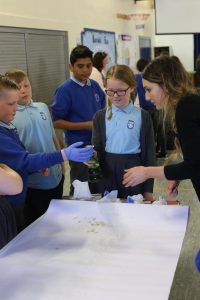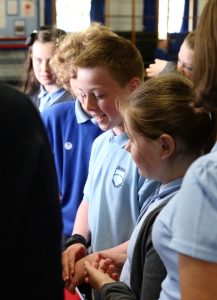When a teacher from Barsail primary school in Erskine asked the SHIP Research Group to help with their health week we jumped at the chance. She had heard about the Guinness World Record breaking attempt that the SHIP research group had been involved in two years ago, when student nurses taught the world’s largest simultaneous hand hygiene lesson (multiple venues).
Since Friday 5th May was World Health Organisation’s Hand Hygiene Day, we decided that this would be the perfect time to hold an infection awareness session at the primary school. Seven members of the team traveled to the school to deliver the session to 41 Primary 7 pupils with the aim of providing them with the knowledge and skills to then disseminate this information to the rest of the school during their health week.

The first part of the session was an interactive lesson about bugs, hand hygiene, cough/cold/sneeze etiquette and antibiotic resistance. The second part of the session involved the pupils, in small groups, taking part in activities comprising of a sneeze runway (complete with bottles of “snot”), performing the 6-step hand hygiene and then checking their hands under the glow box, quizzes and studying the ideas tables, full of activities, to inspire them with suggestions for use in their own teaching. They also took part in a glitter experiment to see how far the glitter from their hands traveled during the one hour session.



This year’s WHO message was “Fight antibiotic resistance -it’s in your hands” and so information was given to the children about when and how to clean their hands, using findings from GCU research (Reilly et al 2016), to prevent the likelihood of spreading germs and therefore limit the use of antibiotics. Other key antibiotic messages were also discussed such as the importance of completing the full course of antibiotics if they are prescribed for you, not using other peoples antibiotics, the self-management of infection and how our own immune system fights infection and that antibiotics do not work on viruses like the common cold.
These pupils will now disseminate this information to pupils and staff, in the rest of the school, and parents during their Health week in June. Pupils have also been issued with teaching charts to complete every time they pass on these important public health messages to another person, and when completed will be issued with a certificate from the SHIP Research Group.

Good hand hygiene is the best way to prevent the spread of infection from person to person. Half of all GP appointments, for children under 14 years old, are due to infections and many school days are lost every year because of infections. Children of primary school age are developing habits for life and they are also good at spreading messages via their friends and family. Therefore, the importance of hand hygiene in primary schools cannot be emphasised enough.
Reilly, J et al. 2016 A Pragmatic Randomized Controlled Trial of 6-Step vs 3-Step Hand Hygiene Technique in Acute Hospital Care in the United Kingdom. Infection Control and Hospital Epidemiology. 37(6): 661-666: https://www.cambridge.org/core/journals/infection-control-and-hospital-epidemiology/article/pragmatic-randomized-controlled-trial-of-6step-vs-3step-hand-hygiene-technique-in-acute-hospital-care-in-the-united-kingdom/7C15A5E18E4F25A54CD436CA7E656B60
